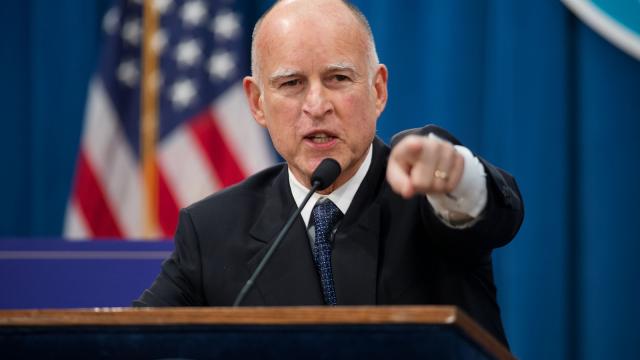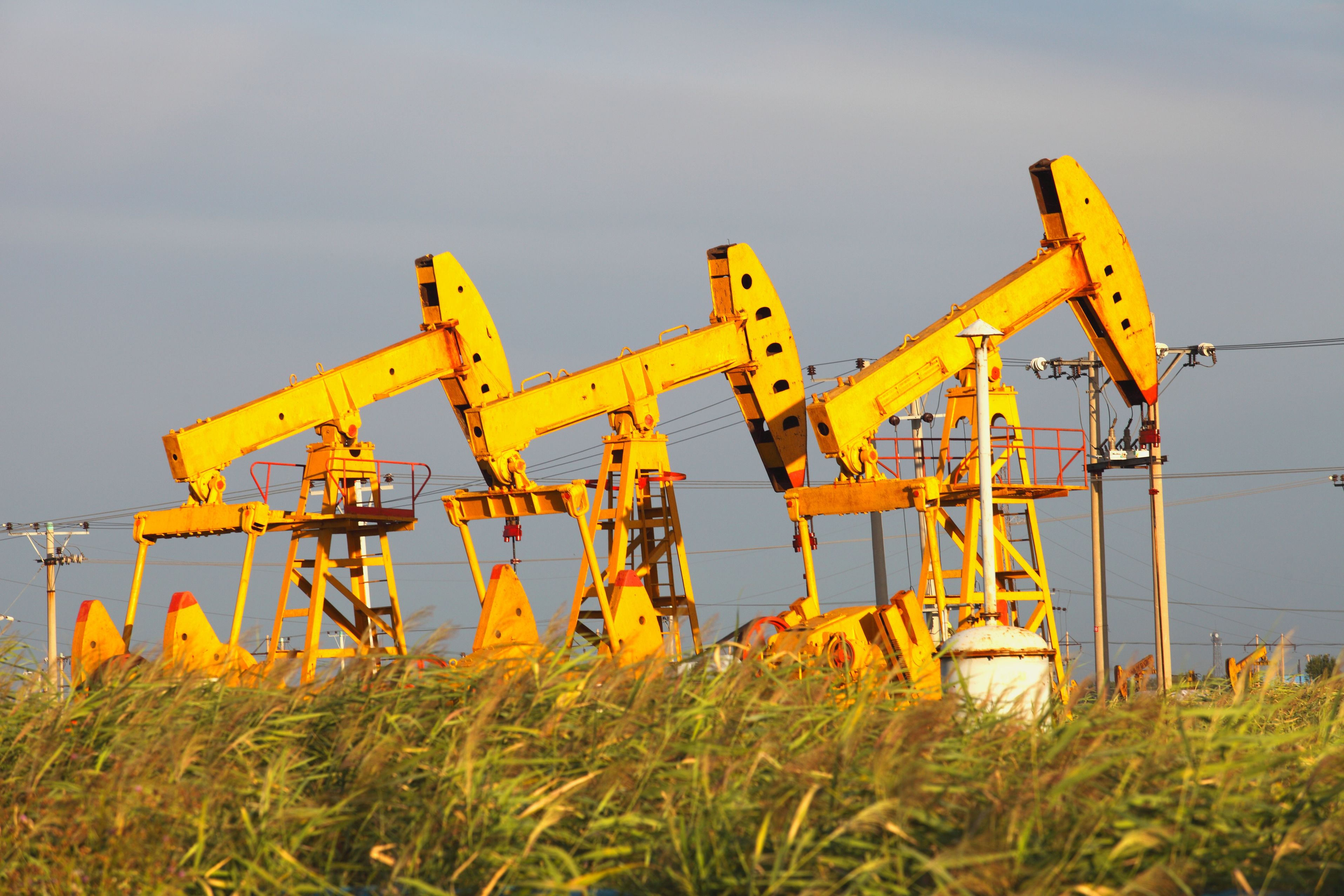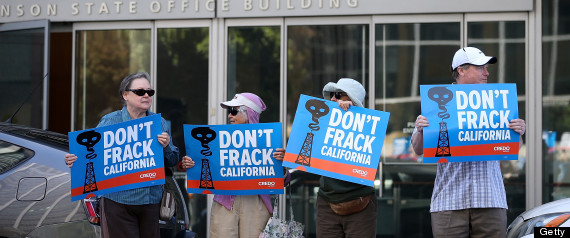
California Governor Jerry Brown talks a big game on climate change. Earlier this year, Brown released a 20-page consensus statement signed by 500 scientists from 44 countries calling for immediate and steep reductions in carbon emissions. Standing onstage beside NASA climate scientist James Hansen to unveil the document at a Silicon Valley tech conference this May, Brown warned that the window for meaningful action on climate change was quickly closing: "If it's like this five years from now, it's over," he told the assembled reporters.
Since then, Brown has signed new solar and electric car legislation and even traveled to Beijing to broker a nonbinding climate agreement with the Chinese government. The 75-year-old, third-term governor is fond of pointing to such a record and challenging national politicians to take California's lead. But if elected officials around the country follow Brown's example when it comes to fracking, all Brown's efforts to stop catastrophic climate change will be for nothing.
In August, Brown gave his blessing to a dramatic expansion of fracking in California's massive oil shale formations, which underlie a large area of the state from Southern to Central California. The fracking bill Brown signed into law, SB4, ensures that fracking will move forward unimpeded for at least the next two years, and exempts fracking from thorough review under the California Environmental Quality Act (CEQA), the state's bedrock environmental law.
How Brown reconciles his stance on climate with his support for fracking has been the question environmentalists have challenged him to answer in recent months. The contrast was on full display in San Francisco on October 28, at the signing of another new climate pact, between California, Oregon, Washington, and British Columbia. Inside the ceremony at the offices of Cisco Systems, Brown proclaimed global warming "the world's greatest existential challenge." On the street outside, anti-fracking protestors chanted, "Climate leaders don't frack!"
Brown addressed the issue at length, for the first time, after that event and then again on KQED's Forum the following day, in his most extensive remarks on fracking to date. In his statements, Brown revealed that, when it comes to fracking, he is not just out-of-step with other proponents of climate action, he is living in his own reality.
The governor, who last year created a website to expose climate deniers' lack of knowledge on global warming, in his recent comments failed to demonstrate a solid grasp of what is arguably the most important environmental decision he will make in his tenure in office — whether or not to allow fracking.
Most strikingly, Brown seemed not to know that fracking is already ongoing in California. "The key point here that most people have in their minds is fracking the Monterey shale. Nobody's doing that. At best, it's several years, if it ever happens," Brown said on Forum.
But fracking is happening in California, including in the state's largest shale formation, the Monterey. The state Division of Oil, Gas, and Geothermal Resources has not tracked fracking activity comprehensively, so the extent of the practice is hard to quantify, but companies like Venoco and Occidental Petroleum have boasted to their investors about their use of unconventional techniques like fracking.
Occidental, the largest acreage holder of oil and gas mineral rights in California and the largest player in the Monterey Shale, told investors in July, "We've drilled approximately 1,300 unconventional wells in California since 1998. More than 1,000 of these have been in and around Elk Hills, including the Monterey and other key shale plays."
Brown also appeared confused about what his own legislation on fracking does. He insisted, "[Fracking] can't happen until a major and the first serious scientific study to an environmental impact analysis that I required by a law I signed two months ago is done."
If Brown's statement were true, SB4 would be a de facto moratorium, which is what most anti-fracking groups in California pushed for this legislative session. In fact, SB4 actually mandates that fracking permits be approved until 2015 - preventing the legislature or Brown from implementing a moratorium or holding back new fracking wells, for any reason, for the next two years. A provision stating that the state "shall" approve new fracking wells was inserted late in the game under pressure from the oil industry.
Such a law is unprecedented, even with the spate of pro-fracking bills that have passed state legislatures in recent months.
"I don't know of any other state that has a provision like this," said Kassie Siegel, senior counsel for the Center for Biological Diversity. "Completing environmental review before allowing an activity to go forward to ensure fully informed decision making is a bedrock principle of environmental law."
It's unclear at this point what it means for Brown's public stance on fracking to be based on such verifiably false premises.
Some have noted that Brown has taken $2.5 million in campaign contributions and other funds from oil and natural gas interests. Occidental Petroleum's donations in particular stand out. Occidental is the largest oil and gas donor to Brown and was also one of the largest single donors to the governor's Proposition 30 ballot campaign to raise taxes on the wealthy. Prop 30 was fought bitterly by corporate-funded PACs, but had the unexpected backing of California oil and gas.
The passage of SB4 has been good news for Occidental. In an October investor call, Occidental executives cited "more favorable permitting" as the impetus behind its plan to increase capital expenditures by $500 million next year in California. "Most of this increase will be directed towards unconventional drilling opportunities where we have more than 1 million prospective acres for unconventional resources," said Occidental president and CEO, Steve Chazen.
Chazen demurred to say how much SB4 specifically had influenced Occidental's plans for 2014, but market observers have been far more blunt about the law's impact. One Reuters analyst recently wrote that SB4 "endorses fracking" and "brings widespread fracking in California a step closer."
Widespread oil fracking shouldn't sound like a winning plan for reducing carbon emissions, and it's not. The Monterey Shale alone is estimated to contain 15.4 billion barrels of oil, making it the biggest shale oil deposit in the United States - roughly twice the size of North Dakota's Bakken Shale. And unlike the Bakken, which produces light, "sweet" crude, the Monterey Shale is made up of thick, heavy oil similar in carbon density to petroleum from tar sands.
Burning all of those 15.4 billion barrels would release 7.7 billion tons of carbon into the atmosphere. That's 17 times California's annual emissions, at 2010 levels, or one year's worth of emissions from the entire nation. For comparison, estimates put the carbon impact of the Keystone XL pipeline at 6.34 billion tons of carbon.
When pressed for an answer on the climate contradiction by the San Jose Mercury News, Brown dodged the question and pivoted to a discussion of the merits of natural gas as a potential bridge fuel, explaining, "This is a complicated equation."
The equation, however, is actually rather simple. As Brown knows full well, we're already on track for serious climate impacts that can only be worsened by increased greenhouse gas emissions. The Intergovernmental Panel on Climate Change just affirmed what has become a rallying cry for climate activists by urging policymakers to start considering most existing fossil fuel reserves off limits. But that shift to a sane climate policy can only happen if elected leaders choose to stand with their constituents over their oil industry donors and reject the dirtiest, most-carbon intensive projects without equivocation.
The IPCC's most recent report makes clear that Governor Brown's legacy as a climate leader stands or falls on what he does next on fracking. If he issues a firm "no" to an industry that, left to its own ends, will jeopardize the ecological foundations of life on Earth, he may well be remembered as a bold climate champion. If, however, he stays the course and allows the oil industry to usher in a new fossil fuel boom in the Golden State, no one will remember him for solar panels or electric vehicles - only for the carbon pollution unleashed by the rush to frack California's Monterey Shale.
3 WAYS TO SHOW YOUR SUPPORT
- Log in to post comments













